>> Click here to register for the event! <<
The Black Lindy Hoppers Fund and Collective Voices for Change present our third edition of Have you met…? with Lindy Hop legend Ms Barbara Billups.
Ms Barbara Billups was the third runner up at the Harvest Moon Ball held in Madison Square Garden 1958 and partnered thereafter with Mr. Sonny Allen’s (champion 1958).
Together with Ms Sugar Sullivan, Ms Barbara was one of the four young ladies of “Sonny Allen and The Rockets” fame.
The Rockets, a song & dance revue, grew out of the dancing at New York’s Savoy Ballroom. They traveled across The United States and Canada, entertaining packed audiences in hotels and nightclubs everywhere.
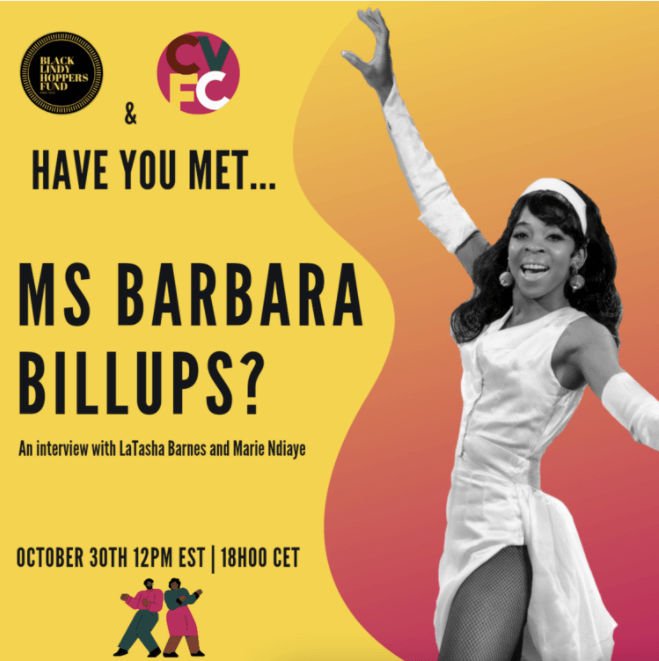
Join us to listen to Ms Barbara discuss her life and career together with BLHF’s LaTasha Barnes and BLHF/CVFC’s Marie N’diaye.
UPDATE: This event got postponed to November 13th, 12pm EST | 18h00 CET
Happy Birthday, Ethel Waters – (October 31, 1896 – died September 1, 1977)
Ethel Waters was an American singer and actress who frequently performed jazz, swing, and pop music on the Broadway stage and in concerts, but began her career in the 1920s singing blues.
The child of a teenage rape victim, Ethel Waters grew up in the slums of Philadelphia and neighboring cities, seldom living anywhere for more than a few weeks at a time. “No one raised me”, she recollected, “I just ran wild.”
Raised in poverty by her grandmother, two aunts and an uncle, the singer’s early life was unstable and uncertain, never staying in one place for more than 15 months at a time.
“I never was a child. I never was cuddled, or liked, or understood by my family,” she would write in His Eye on the Sparrow, her 1951 autobiography, now considered a literary classic. (Source)
She excelled not only at looking after herself, but also at singing and dancing; she began performing at church functions, and as a teenager was locally renowned for her “hip shimmy shake”.
 In the grim darkness of her childhood, Ethel found herself running errands for drug lords in exchange for food and housing. Trapped between the wills of her grandmother and her estranged mother, music was a silver lining and a way out.
In the grim darkness of her childhood, Ethel found herself running errands for drug lords in exchange for food and housing. Trapped between the wills of her grandmother and her estranged mother, music was a silver lining and a way out.
Marrying for the first time at age 12 or 13, her partnership with Merritt Purnsley was abusive and one she left a few years in. Later becoming a hotel maid in Philadelphia. Around the same time, Waters was persuaded by friends to perform two songs at her own 17th birthday party at a nightclub on Juniper Street. Stunning the crowd, the birthday girl won a singing contest that launched her career and began the popularization of jazz-blues music.
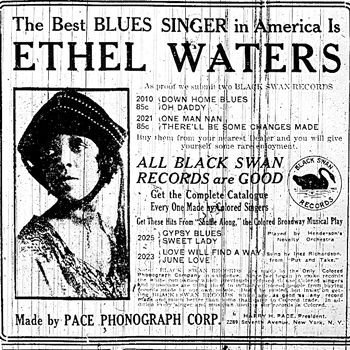
Waters’ winning performance landed her a real gig at Baltimore’s Lincoln Theatre and lead to a string of vaudeville performances with the likes of Bessie Smith, often doing blackface skits for white audiences. Soon after, in 1919, Waters moved to New York City, bringing her act to nightclubs and speakeasies all across Harlem, including the now-iconic Edmond’s Cellar. By 1921, Waters had become just the fifth Black woman to make a record. (Source)
In 1917 she made her debut on the black vaudeville circuit, billed as “Sweet Mama Stringbean” for her tall, lithe build. She broke through with her rendition of “St. Louis Blues”, which Waters performed in a softer and subtler style than her rivals, Ma Rainey and Bessie Smith.
Beginning with her appearances in Harlem nightclubs in the late 1920s, then on the lucrative “white time” vaudeville circuit, she became one of America’s most celebrated and highest-paid entertainers.
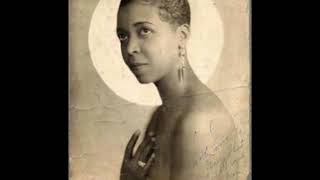
In 1925, Ethel would earn her first hit with the dynamic “Dinah,” making her first appearance at the Plantation Club on Broadway, and touring with the Black Swan Dance Masters. It was at this point that Waters’ career exploded.
She was the first singer to confront racism in a popular song, “Suppertime” in 1933, the same year she introduced “Stormy Weather” at the Cotton Club. (Source)
“I was singing the story of my misery and confusion, the story of the wrongs and outrages done to me by people I had loved and trusted”. Impressed by this performance, Irving Berlin wrote “Supper Time”, a song about a lyncing, for Waters to perform in a Broadway revue. She later became the first African-American star of a national radio show. – IMDb Mini Biography By: David S. Smith
Ethel would go on to be married three times in her life, but one of her most profound relationships was with dancer Ethel Williams. Appearing together on the stage, they were dubbed the “Two Ethels”, despite the great efforts they made to conceal their relationship. They ruled the Harlem nightclub scene along with lesbian and queer blues singers like Gladys Bentley, Bessie Smith, Ma Rainey, and Lucille Bogan.

“What was occurring was occurring clandestinely, or within urban settings that were more or less secret and difficult to penetrate,” said Robert Philipson, director of the documentary, T’Ain’t Nobody’s Bizness: Queer Blues Divas of the 1920s. “It was very much under the cover of the night because they could be prosecuted for same-sex activity. There were some open demonstrations of alternative sexuality in the Harlem Renaissance and in Greenwich Village in the late 20s.”
In many ways, Ethel was the first Black woman to pioneer Black spaces in white entertainment. She was the first Black woman to integrate Broadway, appearing in Irving Berlin’s “As Thousands Cheer” with Clifton Webb, Marilyn Miller, and Helen Broderick. She also performed as a singer with Jack Denny & His Orchestra on a national radio program and appeared in nightclubs around town. During this time she became the highest-paid performer on Broadway.
And on June 15, 1939, NBC debuted The Ethel Waters Show, a variety special that marked the first time an African American would star in her own TV show. A decade later, she was nominated for an Academy Award for Best Supporting Actress in Elia Kazan’s Pinky. During the 1950s, Waters would go on to star in TV series on both ABC and NBC, earning a Primetime Emmy Award nomination in 1962.
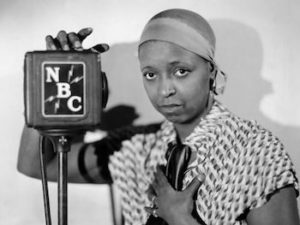
She was the second African American to be nominated for an Academy Award, the first African-American to star on her own television show and the first African-American woman to be nominated for a Primetime Emmy Award.
In middle age, first on Broadway and then in the movies, she successfully recast herself as a dramatic actress. Devoutly religious but famously difficult to get along with, Waters found few roles worthy of her talents in her later years. – IMDb Mini Biography By: David S. Smith
She gave her last performance as a member of Billy Graham’s crusade. She died on September 1, 1977. (Source)
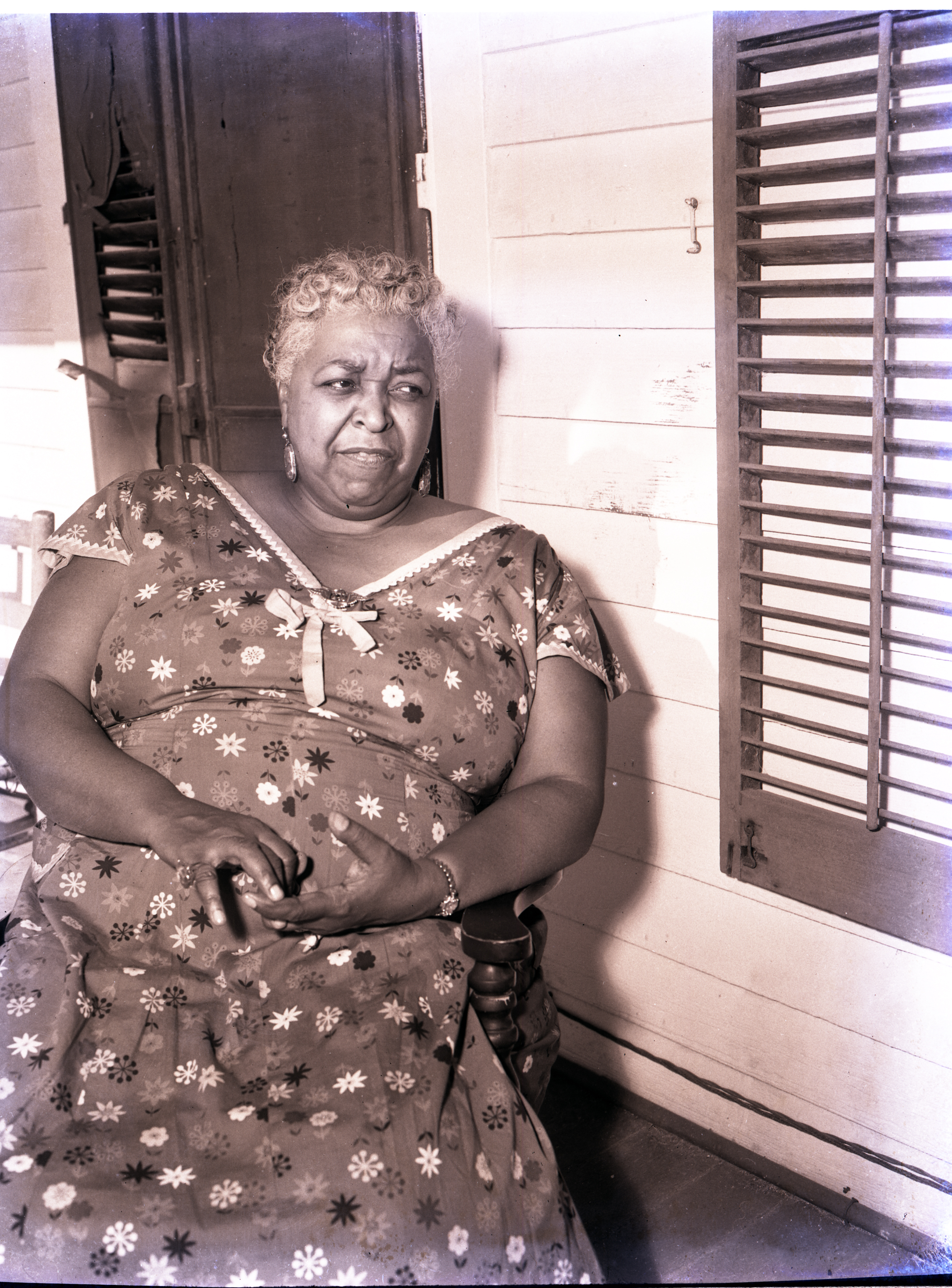
Waters died on September 1, 1977, aged 80, from uterine cancer, kidney failure, and other ailments, in Chatsworth, California. She is buried at Forest Lawn Memorial Park (Glendale).
Waters notable recordings: